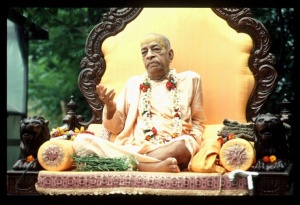CC Madhya 14.168: Difference between revisions
No edit summary |
(Vanibot #0054 edit - transform synonyms into clickable links, which search similar occurrences) |
||
| Line 17: | Line 17: | ||
<div class="synonyms"> | <div class="synonyms"> | ||
''kila-kiñcita'' | ''[//vanipedia.org/wiki/Special:VaniSearch?s=kila&tab=syno_o&ds=1 kila]-[//vanipedia.org/wiki/Special:VaniSearch?s=kiñcita&tab=syno_o&ds=1 kiñcita]'' — a particular type of ecstatic ornament manifested at the time of seeing Kṛṣṇa; ''[//vanipedia.org/wiki/Special:VaniSearch?s=kuṭṭamita&tab=syno_o&ds=1 kuṭṭamita]'' — the symptom explained in verse 197; ''[//vanipedia.org/wiki/Special:VaniSearch?s=vilāsa&tab=syno_o&ds=1 vilāsa]'' — the symptom explained in verse 187; ''[//vanipedia.org/wiki/Special:VaniSearch?s=lalita&tab=syno_o&ds=1 lalita]'' — the symptom explained in verse 192; ''[//vanipedia.org/wiki/Special:VaniSearch?s=vivvoka&tab=syno_o&ds=1 vivvoka]'' — neglecting the presentation given by the hero; ''[//vanipedia.org/wiki/Special:VaniSearch?s=moṭṭāyita&tab=syno_o&ds=1 moṭṭāyita]'' — awakening of lusty desires by the remembrance and words of the hero; ''[//vanipedia.org/wiki/Special:VaniSearch?s=āra&tab=syno_o&ds=1 āra]'' — and; ''[//vanipedia.org/wiki/Special:VaniSearch?s=maugdhya&tab=syno_o&ds=1 maugdhya]'' — assuming the position of not knowing things although everything is known; ''[//vanipedia.org/wiki/Special:VaniSearch?s=cakita&tab=syno_o&ds=1 cakita]'' — a position in which the heroine appears very much afraid although she is not at all afraid. | ||
</div> | </div> | ||
Latest revision as of 21:45, 19 February 2024

A.C. Bhaktivedanta Swami Prabhupada
TEXT 168
- ‘kila-kiñcita’, ‘kuṭṭamita’, ‘vilāsa’, ‘lalita’
- ‘vivvoka’, ‘moṭṭāyita’, āra ‘maugdhya’, ‘cakita’
SYNONYMS
kila-kiñcita — a particular type of ecstatic ornament manifested at the time of seeing Kṛṣṇa; kuṭṭamita — the symptom explained in verse 197; vilāsa — the symptom explained in verse 187; lalita — the symptom explained in verse 192; vivvoka — neglecting the presentation given by the hero; moṭṭāyita — awakening of lusty desires by the remembrance and words of the hero; āra — and; maugdhya — assuming the position of not knowing things although everything is known; cakita — a position in which the heroine appears very much afraid although she is not at all afraid.
TRANSLATION
“Some of the symptoms critically explained in the following verses are kila-kiñcita, kuṭṭamita, vilāsa, lalita, vivvoka, moṭṭāyita, maugdhya and cakita.